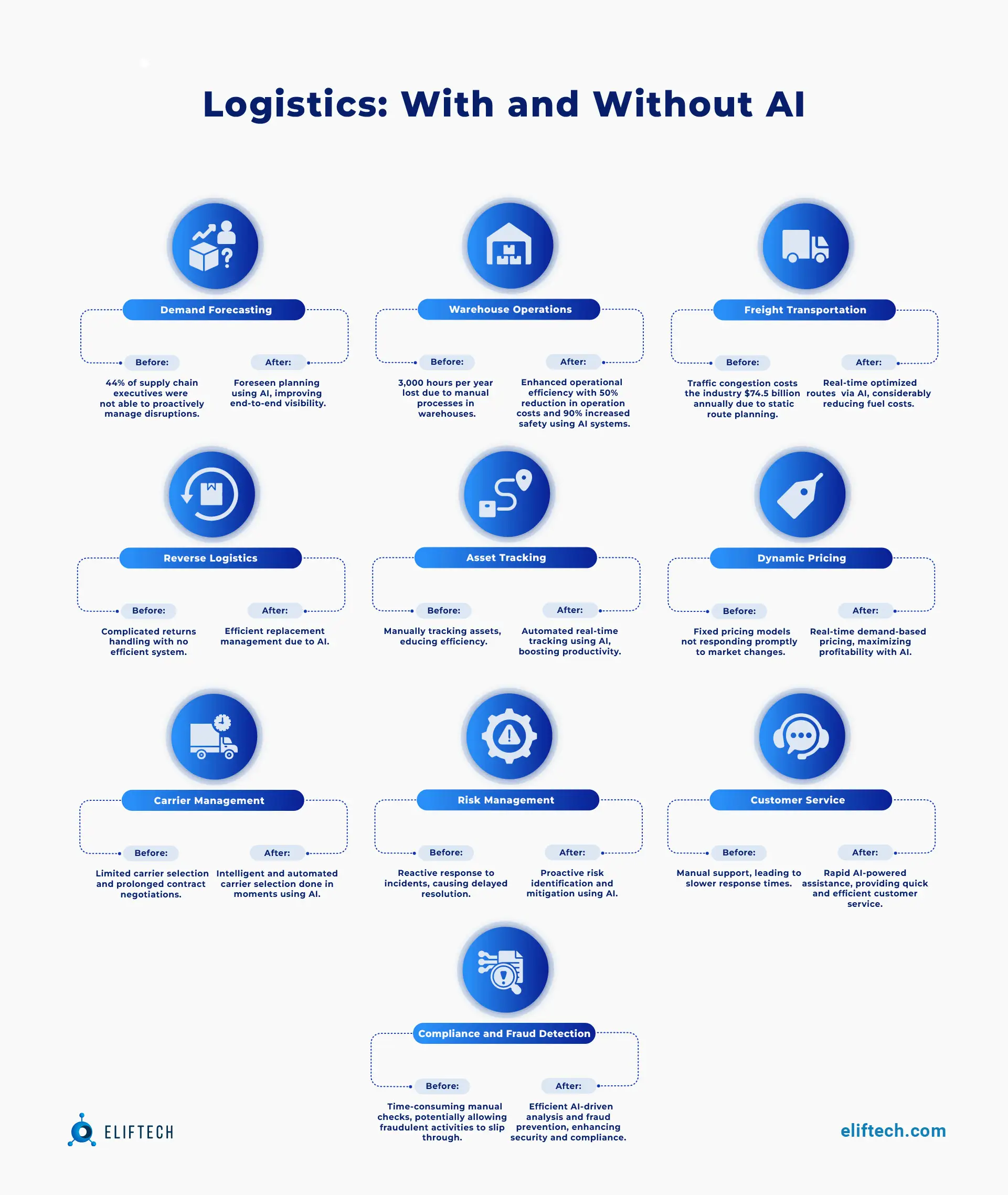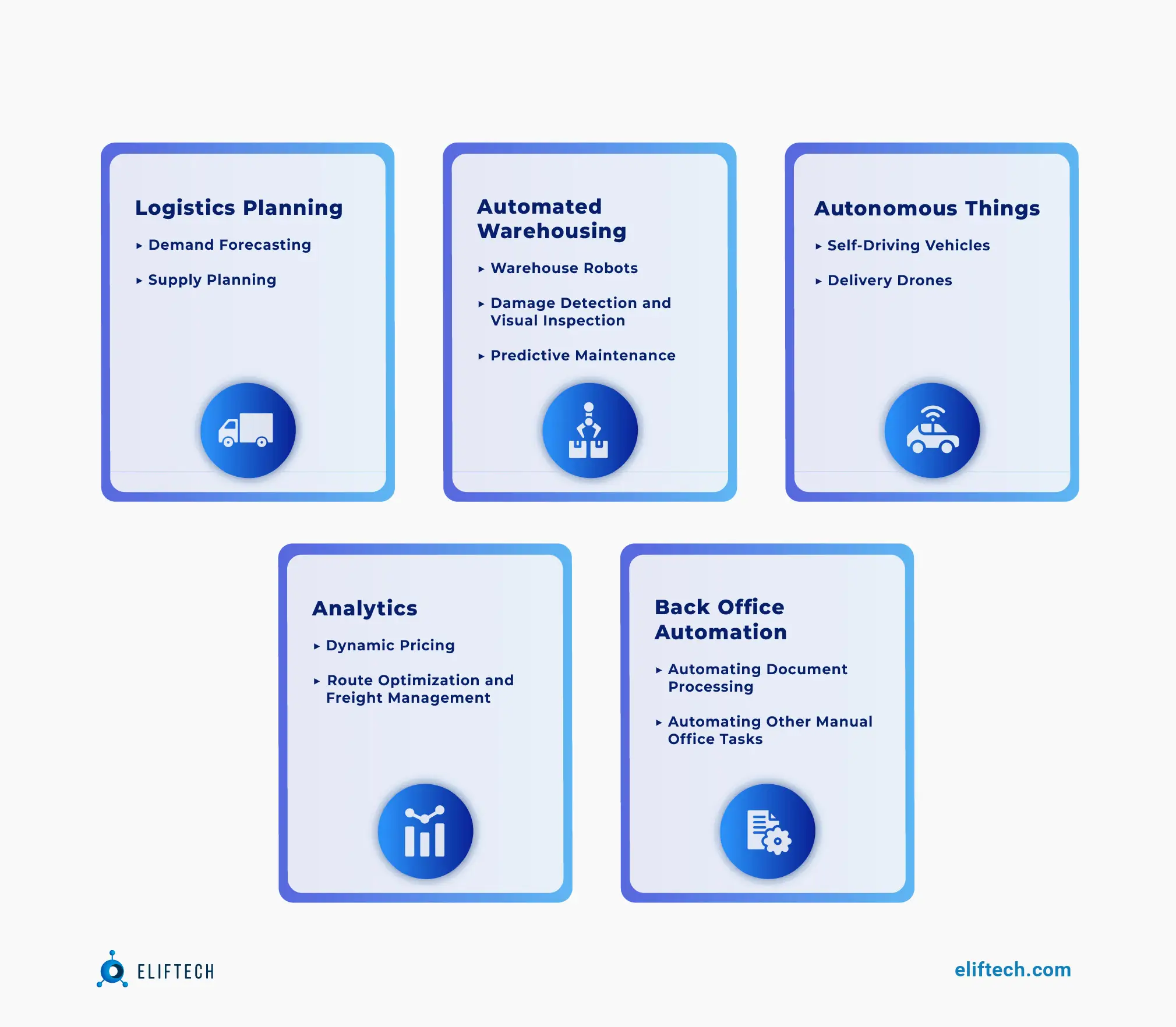AI
AI in Logistics: Benefits, Applications & Leading Examples

AI in logistics is reshaping how companies handle complex, cost-intensive processes. With rising operational expenses and persistent inefficiencies, logistics firms face mounting pressure to embrace digital transformation.
Case in point, AI-driven solutions, like warehouse automation, are already cutting operational costs by up to 50% while boosting safety by 90%. This way, AI provides measurable impact across the industry.
In this article, we’ll explore how AI addresses key logistics challenges, from optimizing routes to improving demand forecasting, and how it’s paving the way for a more efficient, adaptable logistics landscape.
Top Benefits of AI in Logistics Operations
AI in logistics software development transforms manual, time-consuming processes into a streamlined, data-driven ecosystem. In an industry once dominated by static planning and unpredictable delays, AI’s predictive and automated capabilities are creating a profound shift toward efficiency and accuracy.
Challenges of Traditional Logistics
Traditionally, logistics has been a complex, manual industry. About 2/3 of typical warehouse operations like picking, packing, and shipping were manually driven. This traditional approach brought about various challenges:
Delays in the Logistics Chain
Problems like unexpected breakdowns and weather conditions can create significant delays in the logistics chain. For example, in 2021, 53% of merchants reported that they experienced package delays.
Inefficient Route Planning
Without AI, logistics companies have to rely on manual, static route planning that is unable to adapt to real-time changes in traffic or weather conditions. This can lead to longer transit times and increased fuel costs. In fact, traffic congestion alone costs the industry $74.5 billion annually. (American Transportation Research Institute)
Limited Supply Chain Visibility
Managing a supply chain without the predictive capabilities of AI is like sailing in the dark. 44% of supply chain executives prove that they lack the end-to-end visibility necessary to proactively manage disruptions.
Time-Consuming Manual Processes
Without automated systems, executing intricate tasks can be time-consuming and error-prone. Warehouses lose approximately 3,000 hours per year due to overdue and manual processes", pointing out the inefficiencies of a manual logistics system.
This highlights the pressing need for smarter, AI-driven logistics solutions.

How AI-Powered Logistics Tackles These Challenges
With the advent of AI, the logistics landscape witnessed a significant transition. Statistics highlight that 38% of logistics companies actively employed AI, leading to operating cost reductions of up to 50%.
AI's role in addressing traditional challenges:
Cost Savings & Safety
A warehouse with AI can reduce operations costs by 50% while increasing safety by 90%. This allows companies to reallocate resources toward innovation and expansion.
Delay Management
Predictive analytics helps mitigate potential delays before they occur. With AI in supply chain, real-time data enables quick adjustments to keep it moving seamlessly.
Route Optimization
AI reduces transit times and fuel consumption by optimizing delivery routes. Smarter routing also lowers vehicle wear and enhances delivery reliability.
Disruption Preparedness
Predictive capabilities ensure proactive planning for unforeseen events. This helps minimize downtime and maintain customer satisfaction during peak demand.
Task Automation
AI automates complex tasks, enhancing operational efficiency and accuracy. Automation reduces human error, ensuring consistent quality across operations.
In simple terms, introducing AI to logistics has given the industry a total makeover, with experts predicting that by 2035, AI will boost logistics productivity by more than 40%. It's helped solve some of the stubborn problems that slow everything down and has cleared the way for smoother sailing, showing us just how big a difference some smart tech can make.
Drive innovation, streamline operations, and achieve unmatched efficiency. Explore our AI development services today.
LEARN MORE
Explore 8 Game-Changing AI Applications in Logistics

With a broad view of AI's impact on logistics, let’s now explore specific areas where AI has made significant strides—from optimizing warehouses to enhancing delivery routes and predictive analytics.
Discover how our custom tracking system improved efficiency and enhanced delivery precision in our case study.
LEARN MORE
Automated warehousing
A shining example of AI in logistics and supply chain can be found in automated warehousing. AI-powered robots are shouldering functions that were traditionally handled by humans, like sorting and shuttling goods around the warehouse. This cuts back on errors and facilitates optimal space usage.
Moreover, machine learning algorithms help adapt the warehouse organization to future needs by predicting patterns of goods' demand. Alongside these, computer vision technology is ensuring heightened precision in tracking, leading to a revolution in inventory management. So, thanks to AI, the warehousing scene in logistics is morphing from a manual, labor-intensive operation into an efficient, technologically advanced process.
Demand forecasting
AI is innovatively revamping demand forecasting in logistics. Unlike traditional methods reliant on historical data, AI incorporates a vast array of variables like weather patterns, regional events, and more using predictive analytics. This results in highly accurate future demand predictions, improving costs, customer satisfaction, and supply chain management. Also, as AI learns from new data, its forecasting precision continually improves, driving demand forecasting from guesswork to data-driven science in logistics.
Predictive maintenance and damage detection
Traditional maintenance schedules, based on time or usage, often fail to prevent unexpected equipment breakdowns. However, AI can help eliminate such issues by spotting potential problems beforehand.
Predictive maintenance uses AI algorithms to analyze data from sensors installed on equipment. This data can identify patterns or anomalies signifying a potential breakdown, enabling preemptive maintenance and reducing unplanned downtime.
On the other hand, AI in transportation and logistics is also enhancing damage detection. Machine learning combined with computer vision can identify and classify damages in delivered goods or assets. This results in quick resolution, minimizing losses, and ensuring better customer satisfaction.
Stock level optimization
AI is revolutionizing stock-level optimization in logistics, a traditionally complex process fraught with overstocks and stock-outs. However, with AI's ability to dynamically adjust and maintain optimal stock levels using predictive analytics, this is changing.
AI systems analyze various data sources, from historical sales data to real-time demand, and precisely predict future stocking requirements. This reduces the instances of surplus inventory and stock-outs, resulting in significant cost savings and improved customer satisfaction.
In essence, with AI, logistics operators can ensure just the right amount of stock at any given time, making logistics operations more efficient and profitable.
Supply chain optimization
AI is playing a crucial role in supply chain optimization, a vital area within logistics and operations management. Traditional supply chain processes are often complex, time-consuming, and vulnerable to human error. However, AI is enabling a more intelligent, efficient, and resilient supply chain.
Several key aspects of AI-driven supply chain optimization include:
- Demand Forecasting: AI uses historical sales data and multiple external factors to accurately predict future demand, reducing stock-outs and overstocks and minimizing wasted resources.
- Dynamic Route Planning: AI-powered algorithms optimize transportation routes by considering real-time traffic data, fuel consumption, and delivery constraints, resulting in time and cost savings.
- Predictive Maintenance: AI systems analyze equipment sensor data to predict potential breakdowns, enabling proactive maintenance and minimizing downtime.
- Supplier Relationship Management: AI can track supplier performance metrics, identify potential risks, and suggest improvements, fostering better communication and collaboration with suppliers.
Dynamic pricing
AI is changing pricing strategies in logistics through dynamic pricing. Traditional fixed pricing often misses market dynamics, potentially impacting revenue and customer satisfaction. However, AI, by quickly analyzing data like real-time market trends, competitor pricing, and customer purchasing patterns, dynamically adjust prices to optimize sales and profits. Over time, AI's precision in price adjustments improves, ensuring optimal pricing. In essence, AI-powered dynamic pricing boosts both profit margins and customer satisfaction, bringing about a new era of adaptable, intelligent pricing in logistics.
Route optimization
AI is significantly improving route optimization in logistics, which traditionally relies on manual planning and can lead to inefficiency and increased costs. AI employs sophisticated algorithms to analyze various factors, including delivery points, traffic patterns, road conditions, and fuel consumption. Based on this analysis, it generates the most efficient route for deliveries. This not only minimizes travel time and costs but also reduces carbon emissions, proving advantageous for both businesses and the environment. Furthermore, AI systems can adjust routes in real-time in response to changes or disruptions, ensuring that last-mile deliveries are up to today’s standards with documented efficiency gains of up to 30%.
Automating document processing
Last but not least, AI automates the manual and time-consuming process of document processing in logistics. AI-based systems use technologies like Optical Character Recognition (OCR) and Natural Language Processing (NLP) to read, understand, and extract crucial information from physical and digital documents. This facilitates faster data entry, reduces manual errors, and results in significant time and cost savings.
Moreover, AI can manage, organize, and retrieve documents efficiently, thereby streamlining the workflow and significantly improving operational efficiency.
Optimize your logistics operations with our custom solutions designed for efficiency and growth.
LEARN MORE
How Large Companies Are Implementing AI in Logistics
AI is essential for optimizing logistics and supply chains, driving efficiency and cost savings. A recent survey shows that 36% of companies have implemented AI in logistics, with another 28% close behind. Here are key examples of AI applications in logistics.
Amazon
Amazon, a global e-commerce leader, uses AI to enhance several aspects of its logistics operations. AI-powered algorithms aid in accurate demand forecasting, and optimizing inventory management. Additionally, Amazon uses AI for its automated warehousing systems, where robots pick, pack, and sort items, increasing efficiency and reducing errors. In fact, Amazon is known to utilize about 200,000 robots in its warehouses. Furthermore, Amazon is testing drone deliveries and self-driving trucks, both relying on AI for optimization and safety.
FedEx
FedEx uses AI to automate and improve parcel sorting in its hubs. The AI-enabled robots can sort up to 1,200 parcels per hour, significantly reducing sorting time. Additionally, FedEx uses AI for predictive analytics to forecast potential delivery delays due to weather disruptions or traffic congestion, enhancing their overall customer experience.
Learn how our web-based logistics tracking platform transforms shipping management in our case study.
READ THE CASE STUDY
Nuro
Nuro is redefining the realm of logistics and last-mile delivery with its AI-powered fully autonomous vehicles. A brainchild of two former Google engineers, Nuro is a pioneer in harnessing AI to reshape the local commerce landscape. By dedicating itself to unmanned deliveries, Nuro leads an environmentally friendly, efficient, and safer transition in logistics, reducing human-driven delivery errors, traffic congestion, and carbon emissions. It's an illustration of how AI can drastically transform traditional logistics models.
ClearMetal
ClearMetal employs powerful AI-driven predictive analytics to tackle the age-old inefficiencies of the shipping industry. With its AI algorithms, ClearMetal can accurately track, predict, and manage the complex dynamics of container logistics. By doing so, it eliminates unnecessary costs linked with mismanaged goods, underutilized shipping containers, and idle assets. Thus, ClearMetal stands as an excellent example of AI's power to turn data into clear, actionable, cost-saving insights in logistics.
GreyOrange
GreyOrange's sophisticated AI-powered robots are perfect case studies for redefining warehouse and fulfillment center operations. Combining robotics with machine learning, GreyOrange's robotics can pick, sort, and pack goods with a high degree of accuracy and speed, far surpassing human capacity. By automating these repetitive tasks, GreyOrange not only slashes human error and accelerates delivery timelines but also frees human operators to focus on more strategic areas. This illustrates how AI makes logistics operations more efficient and smart.
Book a call with our expert to explore how AI can transform your supply chain, streamline operations, and boost your bottom line.
BOOK A CALL
How to Overcome AI Adoption Challenges in Logistics
Although AI promises significant benefits for the logistics industry, its adoption does not come without challenges. Some of the key obstacles companies face when implementing AI include:
Cost
AI systems can be expensive to purchase, integrate, and maintain. The upfront investment required is still too high for many companies. Acquiring the necessary hardware, software, and expertise requires significant capital expenditure. Smaller firms in particular struggle to get budget approval. However, as AI becomes more ubiquitous, costs are reducing. In reality, AI is one of the factors that help achieve this effect ASAP; according to research, the use of AI in logistics can reduce operating costs by up to 50%.
Integration with legacy systems
Most established logistics companies have legacy IT systems and processes. Integrating sophisticated AI solutions with these can be complex and time-consuming. The level of change required to existing infrastructure is often underestimated. Firms need expertise to map out how AI will work alongside current tools.
Finding the right talent
There is a shortage of staff skilled in areas like machine learning, data science, and AI development. Logistics firms cannot easily recruit the experts needed to implement solutions. Existing employees may lack the capabilities to work alongside AI systems. Extensive retraining and upskilling are usually required.
Managing organizational change
Adopting AI necessitates major changes to operations, roles, and company culture. Having to manage this transition can deter firms from pursuing AI. Employees may be resistant based on misconceptions about AI. Communicating the benefits and providing training helps smooth the path to adoption.
How ElifTech Can Help
If your logistics operations are facing rising costs, route inefficiencies, or struggles adapting to rapid market changes, AI can be the solution. ElifTech’s AI-driven services are designed to tackle these specific challenges by automating manual tasks, optimizing routes, and improving demand forecasting, resulting in significant cost savings and increased productivity.
With over a decade of industry expertise, ElifTech provides custom solutions tailored to meet your needs, including:
• Warehousing Management Systems (WMS)
• Transportation Management Systems (TMS)
• Order Management Systems (OMS)
We ensure seamless integration with existing systems, providing end-to-end modernization with API and third-party support. Our solutions deliver key AI-driven features, such as:
• Fuel consumption monitoring and analytics
• Dynamic route optimization
• Accurate demand prediction and capacity planning
• Predictive maintenance for equipment
ElifTech’s team of AI strategists, data scientists, and engineers brings the specialized knowledge needed to align AI solutions with your business goals, ensuring a smooth transition and maximum impact.
